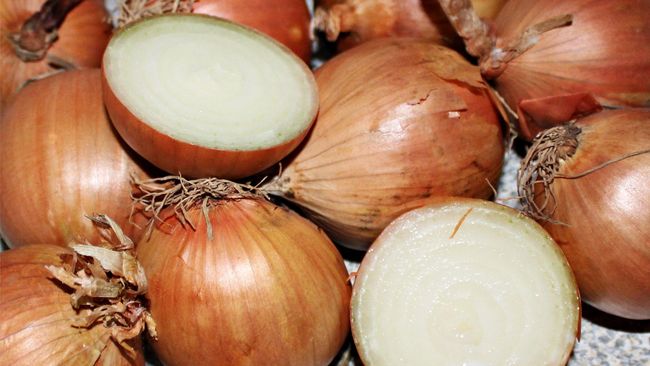Jakarta, CNN Indonesia –
Even though it is rarely used, there are several types of food that feel lacking in the absence garlic. Stir-fry vegetables, salads, soups, taste better thanks to the onions.
Onions belong to the allium family along with garlic and onions. Its large size and more water content make this activity of slicing food a struggle.
However, behind the tears from the activity of slicing onions, you can get a number of benefits for the body.
As quoted from Good Housekeeping, medium-sized onions contain 44 calories, 13 grams of carbohydrates, 1 gram of protein, 2.5 grams of fiber, 6 grams of sugar, less than 1 gram of total fat as well as minerals (potassium and magnesium) and vitamins (vitamin C and vitamin B6).
Of these nutritional content, stored various benefits of onions for health. Anything?
1. Improve heart health
Consumption of onions can help improve heart health. Its antioxidant content can fight inflammation, lower triglycerides and lower cholesterol levels.
All of which will lower your risk of heart disease as well as overall cardiovascular disease.
Reported HealthlineIts strong anti-inflammatory properties can help reduce high blood pressure and protect against blood clots. Onions contain quercetin, a flavonoid component that can help fight inflammation.
A study of 70 people who were overweight and had high blood pressure found a dose of 162 milligrams of onion extract with quercetin per day significantly lowered systolic blood pressure 3-6 mmHg compared to placebo.
2. Strengthens immunity
In a medium onion contains 11 milligrams of vitamin C. Vitamin C can strengthen the immune system.
Not only that, the ability to protect the body from disease is also complemented by the content of the phytochemical components of onions.
3. Reducing the risk of cancer
Consumption of foods containing allium is associated with a reduced risk of several types of cancer, including stomach cancer and colon (colorectal) cancer.
A review of 26 studies showed that consumption of vegetables with allium was 22 percent less likely to be diagnosed with stomach cancer than those who ate the least.
The anticancer activity in onions is due to the sulfur and flavonoids content, especially fisetin and quercetin. These antioxidants are known to be able to fight tumor growth.
“Berallium vegetables, such as onions and garlic, are rich in antioxidants and are thought to have anti-inflammatory effects,” explains Sassos, a nutrition oncology specialist.
“They provide organosulfur compounds that may reduce the risk of certain cancers including prostate cancer. They make an excellent addition to an anticancer diet.”
4. Help control blood sugar
Onions are good for those who have diabetes or prediabetes. A study in 42 people with type 2 diabetes, showed that consuming 100 grams of fresh red onions reduced fasting sugar levels by about 40 mg / dl after 4 hours.
5. Increase bone density
Supports health, strength and bone density not only by consuming dairy products. Onions have been shown to provide similar benefits.
Studies in menopausal women have shown that consuming 100 milliliters of onion juice daily for 8 weeks can increase bone density.
Experts believe onions reduce oxidative stress, increase antioxidant levels and reduce decreased bone density thereby lowering the risk of osteoporosis.
6. Healthy digestion
The fiber in onions is good for digestion. Fiber will be food for good bacteria in the intestines so that digestion is maintained and helps strengthen immunity at the same time.
A 2018 meta-analysis found the fiber in onions (as well as in garlic, wheat, and nuts) is more effective at nourishing gut microbes than fiber from other foods.
7. Sources of antioxidants
Antioxidants are components that can fight the oxidation process. Oxidation is a process of cell damage and contributes to a number of diseases. Onions offer more than 25 types of antioxidant flavonoids.
Onions, for example, contain anthocyanins or plant pigments that give onions their red color.
Various studies have shown that consumption of foods rich in anthocyanins has a lower risk of heart disease.
(the / agn)
– .


